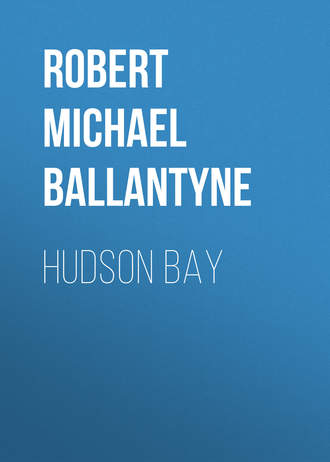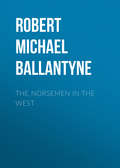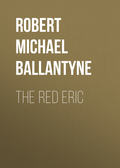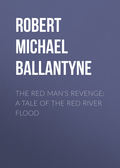
Robert Michael Ballantyne
Hudson Bay
Monday, 22nd.—Rain obliged us to put ashore this morning. Nothing can be more wretched than travelling in rainy weather. The men, poor fellows, do not make the least attempt to keep themselves dry; but the passengers endeavour, by means of oiled cloths, to keep out the wet; and under this they broil and suffocate, till at last they are obliged to throw off the covering. Even were this not the case, we should still be wretched, as the rain always finds its way in somewhere or other; and I have been often awakened from a nap by the cold trickling of moisture down my back, and have discovered upon moving that I was lying in a pool of water. Ashore we are generally a little more comfortable, but not much. After dinner we again started, and advanced on our journey till sunset.
Tuesday, 23rd.—To-day we advanced very slowly, owing to the shallowness of the water, and crossed a number of portages. During the day we ran several rapids. This is very exciting work. Upon nearing the head of a large rapid, the men strain every muscle to urge the canoe forward more quickly than the water, so that it may steer better. The bowsman and steersman stand erect, guiding the frail bark through the more unbroken places in the fierce current, which hisses and foams around, as if eager to swallow us up. Now we rush with lightning force towards a rock, against which the water dashes in fury; and to an uninitiated traveller we appear to be on the point of destruction. But one vigorous stroke from the bowsman and steersman (for they always act in concert) sends the light craft at a sharp angle from the impending danger; and away we plunge again over the surging waters—sometimes floating for an instant in a small eddy, and hovering, as it were, to choose our path; and then plunging swiftly forward again through the windings of the stream, till, having passed the whole in safety, we float in the smooth water below.
Accidents, as may be supposed, often happen; and to-day we found that there is danger as well as pleasure in running the rapids. We had got over a great part of the day in safety, and were in the act of running the first part of the Rose Rapid, when our canoe struck upon a rock, and wheeling round with its broadside to the stream, began to fill quickly. I could hear the timbers cracking beneath me under the immense pressure. Another minute, and we should have been gone; but our men, who were active fellows, and well accustomed to such dangers, sprang simultaneously over the side of the canoe, which, being thus lightened, passed over the rock, and rushed down the remainder of the rapid stern foremost ere the men could scramble in and resume their paddles. When rapids were very dangerous, most of the cargo was generally disembarked; and while one half of the crew carried it round to the still water below, the other half ran down light.
Crossed two small portages and the Mountain Portage in the afternoon; on the latter of which I went to see a waterfall, which I was told was in its vicinity. I had great difficulty in finding it at first, but its thundering roar soon guided me to a spot from which it was visible. Truly, a grander waterfall I never saw. The whole river, which was pretty broad, plunged in one broad white sheet over a precipice, higher by a few feet than the famous Falls of Niagara; and the spray from the foot sprang high into the air, bedewing the wild, precipitous crags with which the fall is encompassed, and the gloomy pines that hang about the clefts and fissures of the rocks. Fur-traders have given it the name of the Mountain Fall, from a peculiar mountain in its vicinity; but the natives call it the Kackabecka Falls. After making a sketch of it, and getting myself thoroughly wet in so doing, I returned to the canoe.
In the evening we encamped within nine miles of Fort William, having lost one of our men, who went ashore to lighten the canoe while we ran a rapid. After a good deal of trouble we found him again, but too late to admit of our proceeding to the fort that night.
Wednesday, 24th.—Early this morning we left the encampment, and after two hours’ paddling Fort William burst upon our gaze, mirrored in the limpid waters of Lake Superior—that immense fresh-water sea, whose rocky shores and rolling billows vie with the ocean itself in grandeur and magnificence.
Fort William was once one of the chief posts in the Indian country, and, when it belonged to the North-West Company, contained a great number of men. Now, however, much of its glory has departed. Many of the buildings have been pulled down, and those that remain are very rickety-looking affairs. It is still, however, a very important fishing station, and many hundreds of beautiful white-fish, with which Lake Superior swarms, are salted there annually for the Canada markets. These white-fish are indeed excellent; and it is difficult to say whether they or the immense trout, which are also caught in abundance, have the most delicate flavour. These trout, as well as white-fish, are caught in nets; and the former sometimes measure three feet long, and are proportionately broad. The one we had to breakfast on the morning of our arrival must have been very nearly this size.
The fur-trade of the post is not very good, but the furs traded are similar to those obtained in other parts of the country.
A number of canôtes de maître, or very large canoes, are always kept in store here, for the use of the Company’s travellers. These canoes are of the largest size, exceeding the north canoe in length by several feet, besides being much broader and deeper. They are used solely for the purpose of travelling on Lake Superior, being much too large and cumbersome for travelling with through the interior. They are carried by four men instead of two, like the north canoe; and, besides being capable of carrying twice as much cargo, are paddled by fourteen or sixteen men. Travellers from Canada to the interior generally change their canôtes de maître for north canoes at Fort William, before entering upon the intricate navigation through which we had already passed; while those going from the interior to Canada change the small for the large canoe. As we had few men, however, and the weather appeared settled, we determined to risk coasting round the northern shore of the lake in our north canoe.
The scenery around the fort is very pretty. In its immediate vicinity the land is flat, covered with small trees and willows, which are agreeably suggestive of partridges and other game; but in the distance rise goodly-sized mountains; and on the left hand the noble expanse of the Lake Superior, with rocky islands on its mighty bosom and abrupt hills on its shores, stretches out to the horizon. The fort is built at the mouth of the Kamenistaquoia River, and from its palisades a beautiful view of the surrounding country can be obtained.
As the men wanted rest and our canoe a little repair, we determined to remain all day at Fort William; so some of the men employed themselves re-gumming the canoe, while others spread out our blankets and tents to dry. This last was very necessary as on the journey we have little time to spare from eating and sleeping while on shore; and many a time have I, in consequence, slept in a wet blanket.
The fair lady of the gentleman in charge of the fort was the only lady at the place, and indeed the only one within a circuit of six hundred miles—which space, being the primeval forest, was inhabited only by wild beasts and a few Indians. She was, consequently, very much delighted to meet with Mrs Bain, who, having for so many days seen no one but rough voyageurs, was equally delighted to meet her. While they went off to make the most of each other, Mr Bain and I sauntered about in the vicinity of the fort, admiring the beauty of the scenery, and paid numerous visits to a superb dairy in the fort, which overflowed with milk and cream. I rather think that we admired the dairy more than the scenery. There were a number of cows at the post, a few of which we encountered in our walk, and also a good many pigs and sheep. In the evening we returned, and at tea were introduced to a postmaster, who had been absent when we arrived. This postmaster turned out to be a first-rate player of Scotch reels on the violin. He was self-taught, and truly the sweetness and precision with which he played every note and trill of the rapid reel and strathspey might have made Neil Gow himself envious. So beautiful and inspiriting were they, that Mr Bain and our host, who were both genuine Highlanders, jumped simultaneously from their seats, in an ecstasy of enthusiasm, and danced to the lively music till the very walls shook; much to the amusement of the two ladies, who, having been both born in Canada, could not so well appreciate the music. Indeed, the musician himself looked a little astonished, being quite ignorant of the endearing recollections and associations recalled to the memory of the two Highlanders by the rapid notes of his violin. They were not, however, to be contented with one reel; so, after fruitlessly attempting to make the ladies join us, we sent over to the men’s houses for the old Canadian wife of Pierre Lattinville and her two blooming daughters. They soon came, and after much coyness, blushing, and hesitation, at last stood up, and under the inspiring influence of the violin we:—
“Danced, till we were like to fa’,
The reel o’ Tullochgorum!”
And did not cease till the lateness of the hour and the exhaustion of our musician compelled us to give in.
On the following morning we bade adieu to the good people at Fort William, and began our journey along the northern shore of Lake Superior, which is upwards of three hundred miles in diameter. Fortune, however, is proverbially fickle, and she did not belie her character on this particular day. The weather, when we started, was calm and clear, which pleased us much, as we had to make what is called a traverse—that is, to cross from one point of land to another, instead of coasting round a very deep bay. The traverse which we set out to make on leaving Fort William was fourteen miles broad, which made it of some consequence our having a calm day to cross it in our little egg-shell of a canoe. Away we went, then, over the clear lake, singing “Rose Blanche” vociferously. We had already gone a few miles of the distance, when a dark cloud rose on the seaward horizon. Presently the water darkened under the influence of a stiff breeze, and in less than half an hour the waves were rolling and boiling around us like those of the Atlantic. Ahead of us lay a small island, about a mile distant; and towards this the canoe was steered, while the men urged it forward as quickly as the roughness of the sea would allow. Still the wind increased, and the island was not yet gained. Some of the waves had broken over the edge of the canoe, and she was getting filled with water; but a kind Providence permitted us to reach the island in safety, though not in comfort, as most of the men were much wet, and many of them a good deal frightened.
On landing, we pitched our tents, made a fire, and proceeded to dry ourselves, and in less than an hour were as comfortable as possible. The island on which we had encamped was a small rocky one, covered with short heathery-looking shrubs, among which we found thousands of blaeberries. On walking round to the other side of it, I discovered an Indian encamped with his family. He supplied us with a fine white-fish, for which our men gave him a little tobacco and a bit of the fresh mutton which we had brought with us from Fort William.
Three days did we remain on this island, while the wind and waves continued unceasingly to howl and lash around it, as if they wished, in their disappointment, to beat it down and swallow us up, island and all; but towards the close of the third day the gale moderated, and we ventured again to attempt the traverse. This time we succeeded, and in two hours passed Thunder Point, on the other side of which we encamped.
The next day we could only travel till breakfast-time, as the wind again increased so much as to oblige us to put ashore. We comforted ourselves, however, with the prospect of a good mutton-chop.
The fire was soon made, the kettle on, and everything in preparation, when the dreadful discovery was made that the whole of the fresh mutton had been forgotten! Words cannot paint our consternation at this discovery. Poor Mrs Bain sat in mute despair, thinking of the misery of being reduced again to salt pork; while her husband, who had hitherto stood aghast, jumped suddenly forward, and seizing a bag of fine potatoes that had been given to the men, threw it, in a transport of rage, into the lake, vowing that as we were, by their negligence, to be deprived of our mutton, they certainly should also be sufferers with us.
It was very laughable to behold the rueful countenances of the men as their beautiful, large white potatoes sank to the bottom of the clear lake, and shone brightly there, as if to tantalise them, while the rippling water caused them to quiver so much that the lake seemed to rest on a pavement of huge potatoes! None dared, however, attempt to recover one; but after a while, when Mr Bain’s back was turned, a man crept cautiously down to the water’s edge, and gathered as many as were within reach—always, however, keeping an eye on his master, and stooping in an attitude that would permit of his bolting up on the slightest indication of a wrathful movement.
It would be tedious, as well as unnecessary, to recount here all the minutiae of our voyage across Lake Superior; I shall merely touch on a few of the more particular incidents.
On the 1st of October we arrived at the Pic House9, where we spent the night; and, after a rough voyage, reached Michipicoton on the 4th. Our voyage along Lake Superior was very stormy and harassing, reminding us often of Lake Winnipeg. Sometimes we were paddling along over the smooth water, and at other times lying-by, while the lake was lashed into a mass of foam and billows by a strong gale. So much detention, and the lateness of the season, rendered it necessary to take advantage of every lull and calm hour that occurred, so that we travelled a good deal during the night. This sort of travelling was very romantic.
On one occasion, after having been ashore two days, the wind moderated in the afternoon, and we determined to proceed, if possible. The sun set gloriously, giving promise of fine weather. The sky was clear and cloudless, and the lake calm. For an hour or so the men sang as they paddled, but as the shades of evening fell they ceased; and as it was getting rather chilly, I wrapped myself in my green blanket (which served me for a boat-cloak as well as a bed), and soon fell fast asleep.
How long I slept I know not; but when I awoke, the regular, rapid hiss of the paddles struck upon my ear, and upon throwing off the blanket the first thing that met my eye was the dark sky, spangled with the most gorgeous and brilliant stars I ever beheld. The whole scene, indeed, was one of the most magnificent and awful that can be imagined. On our left hand rose tremendous precipices and cliffs, around the bottom and among the caverns of which the black waters of the lake curled quietly (for a most death-like, unearthly calm prevailed), sending forth a faint hollow murmur, which ended, at long intervals, in a low melancholy cadence. Before and behind us abrupt craggy islands rose from the water, assuming every imaginable and unimaginable shape in the uncertain light; while on the right the eye ranged over the inky lake till it was lost in thick darkness. A thin, transparent night-fog added to the mystical appearance of the scene, upon which I looked with mingled feelings of wonder and awe. The only distinct sound that could be heard was the measured sound of the paddles, which the men plied in silence, as if unwilling to break the stillness of the night. Suddenly the guide uttered in a hoarse whisper, “A terre!” startling the sleepy men, and rendering the succeeding silence still more impressive.
The canoe glided noiselessly through a maze of narrow passages among the tall cliffs, and grounded on a stony beach. Everything was then carried up, and the tents pitched in the dark, as no wood could be conveniently found for the purpose of making a fire; and without taking any supper, or even breaking the solemn silence of the night, we spread our beds as we best could upon the round stones (some of which were larger than a man’s fist), and sank into repose. About a couple of hours afterwards we were roused by the anxious guide, and told to embark again. In this way we travelled at night or by day, as the weather permitted—and even, upon one or two occasions, both night and day—till the 12th of October, when we arrived at the Sault de Ste. Marie, which is situated at the termination of Lake Superior, just as our provisions were exhausted.
We had thus taken eighteen days to coast the lake. This was very slow going indeed, the usual time for coasting the lake in a north canoe being from eight to ten days.
The Sault de Ste. Marie is a large rapid, which carries the waters of Lake Superior into Lake Huron. It separates the British from the American possessions, and is fortified on the American side by a large wooden fort, in which a body of soldiers are constantly resident. There is also a pretty large village of Americans, which is rapidly increasing. The British side is not fortified; and, indeed, there are no houses of any kind except the few belonging to the Hudson Bay Company. This may be considered the extreme outskirts of civilisation, being the first place where I had seen any number of people collected together who were unconnected with the Hudson Bay Company.
I was not destined, however, to enjoy the sight of new faces long, for next morning we started to coast round the northern and uninhabited shores of Lake Huron, and so down the Ottawa to Montreal. Mr and Mrs Bain left me here, and proceeded by the route of the Lakes.
During the next few days we travelled through a number of rivers and lakes of various sizes; among the latter were Lakes Huron and Nipisingue. In crossing the latter, I observed a point on which were erected fourteen rough wooden crosses. Such an unusual sight excited my curiosity, and upon inquiring I found that they were planted there to mark the place where a canoe, containing fourteen men, had been upset in a gale, and every soul lost. The lake was clear and smooth when we passed the melancholy spot, and many a rolling year has defaced and cast down the crosses since the unfortunate men whose sad fate they commemorate perished in the storm.
While searching about the shore one night for wood to make a fire, one of our men found a large basket, made of bark, and filled with fine bears’-grease, which had been hid by some Indians. This was considered a great windfall; and ere two days were passed the whole of it was eaten by the men, who buttered their flour cakes with it profusely.
Not long after this we passed a large waterfall, where a friend of mine was once very nearly lost. A projecting point obliges the traveller to run his canoe rather near the head of the fall, for the purpose of landing to make the portage. From long habit the guides had been accustomed to this, and always effected the doubling of the point in safety. Upon this occasion, however, either from carelessness or accident, the canoe got into the strong current, and almost in an instant was swept down towards the fall. To turn the head of the canoe up the stream, and paddle for their lives, was the work of a moment; but before they got it fairly round they were on the very brink of the cataract, which, had they gone over it, would have dashed them to a thousand atoms. They paddled with the strength of desperation, but so strong was the current that they remained almost stationary. At last they began slowly to ascend—an inch at a time—and finally reached the bank in safety.
On Sunday the 19th of October we commenced descending the magnificent river Ottawa, and began to feel that we were at last approaching the civilised nations of the earth. During the day we passed several small log-huts, or shanties, which are the temporary dwelling-places of men who penetrate thus far into the forest for the purpose of cutting timber. A canoe full of these adventurous pioneers also passed us; and in the evening we reached Fort Mattawan, one of the Company’s stations. At night we encamped along with a party who were taking provisions to the wood-cutters.
The scenery on the Ottawa is beautiful, and as we descended the stream it was rendered more picturesque and interesting by the appearance, occasionally, of that, to us, unusual sight, a farmhouse. They were too few and far between, however, to permit of our taking advantage of the inhabitants’ hospitality, and for the next four days we continued to make our encampments in the woods as heretofore. At one of these frontier farms our worthy guide discovered, to his unutterable astonishment and delight, an old friend and fellow-voyageur, to greet whom he put ashore. The meeting was strange: instead of shaking hands warmly, as I had expected, they stood for a moment gazing in astonishment, and then, with perfect solemnity, kissed each other—not gently on the cheek, but with a good hearty smack on their sunburnt lips. After conversing for a little, they parted with another kiss.
On the fourth day after this event we came in sight of the village of Aylmer, which lay calmly on the sloping banks of the river, its church spire glittering in the sun, and its white houses reflected in the stream.
It is difficult to express the feelings of delight with which I gazed upon this little village, after my long banishment from the civilised world. It was like recovering from a trance of four long dreamy years; and I wandered about the streets, gazing in joy and admiration upon everything and everybody, but especially upon the ladies, who appeared quite a strange race of beings to me—and all of them looked so beautiful in my eyes (long accustomed to Indian dames), that I fell in love with every one individually that passed me in the village. In this happy mood I sauntered about, utterly oblivious of the fact that my men had been left in a public-house, and would infallibly, if not prevented, get dead drunk. I was soon awakened to this startling probability by the guide, who walked up the road in a very solemn I’m-not-at-all-drunk sort of a manner, peering about on every side, evidently in search of me. Having found me, he burst into an expression of unbounded joy; and then, recollecting that this was inconsistent with his assumed character of sobriety, became awfully grave, and told me that we must start soon, as the men were all getting tipsy.
The following day we arrived at Bytown.
This town is picturesquely situated on the brow of a stupendous cliff, which descends precipitously into the Ottawa. Just above the town a handsome bridge stretches across the river, near which the Kettle Fall thunders over a high cliff. We only stayed a few minutes here, and then proceeded on our way.
During the day we passed the locks of the Rideau Canal, which rise, to the number of eight or ten, one over another like steps; and immediately below them appeared the Curtain Falls. These falls are not very picturesque, but their great height and curtain-like smoothness render them an interesting object. After this, villages and detached houses became numerous all the way down the river; and late in the evening of the 24th we arrived at a station belonging to the Hudson Bay Company, on the Lake of the Two Mountains, where we passed the remainder of the night.
Here, for the first time since leaving home, I was ushered into a civilised drawing-room; and when I found myself seated on a cushioned chair, with my moccasined feet pressing a soft carpet, and several real, bonâ fide ladies (the wife and daughters of my entertainer) sitting before me, and asking hundreds of questions about my long voyage, the strange species of unbelief in the possibility of again seeing the civilised world, which had beset me for the last three years, began slowly to give way, and at last entirely vanished when my host showed me into a handsomely furnished bedroom, and left me for the night.
The first thing that struck me on entering the bedroom was the appearance of one of our voyageurs, dressed in a soiled blue capote, dilapidated corduroy trousers, and moccasins; while his deeply sunburnt face, under a mass of long straggling hair, stared at me in astonishment! It will doubtless be supposed that I was much horrified at this apparition. I was, indeed, much surprised; but, seeing that it was my own image reflected in a full-length looking-glass, I cannot say that I felt extremely horrified. This was the first time that I had seen myself—if I may so speak—since leaving Norway House; and, truly, I had no reason to feel proud of my appearance.
The following morning, at four o’clock, we left the Lake of the Two Mountains; and in the afternoon of the 25th October, 1845, arrived at Lachine, where, for the time, my travels came to a close—having been journeying in the wilderness for sixty-six days.
Soon after my arrival winter set in, and I became acquainted with a few of the inhabitants of Lachine. The moment the snow fell, wheeled carriages were superseded by carioles and sleighs of all descriptions. These beautiful vehicles are mounted on runners, or large skates, and slide very smoothly and easily over the snow, except when the road is bad; and then, owing to the want of springs, sleighs become very rough carriages indeed. They are usually drawn by one horse, the harness and trappings of which are profusely covered with small round bells. These bells are very necessary appendages, as little noise is made by the approach of a sleigh over the soft snow, and they serve to warn travellers in the dark. The cheerful tinkling music thus occasioned on the Canadian roads is very pleasing. Sleighs vary a good deal in structure and costliness of decoration; and one often meets a rough, cheerful Canadian habitant sitting in his small box of a sledge (painted sometimes red and sometimes green), lashing away at his shaggy pony in a fruitless attempt to keep up with the large graceful sleigh of a wealthy inhabitant of Montreal, who, wrapped up in furs, drives tandem, with two strong horses, and loudly tinkling bells.
Reader, I had very nearly come to the resolution of giving you a long account of Canada and the Canadians, but I dare not venture on it. I feel that it would be encroaching upon the ground of civilised authors; and as I do not belong to this class, but profess to write of savage life, and nothing but savage life, I hope you will extend to me your kind forgiveness if I conclude this chapter rather abruptly.
It is a true saying that the cup of happiness is often dashed from the lips that are about to taste it. I have sometimes proved this to be the case. The cup of happiness, on the present occasion, was the enjoyment of civilised and social life; and the dashing of it away was my being sent, with very short warning, to an out-of-the-way station, whose name, to me, was strange—distance uncertain, but long—appearance unknown, and geographical position a most profound mystery.







